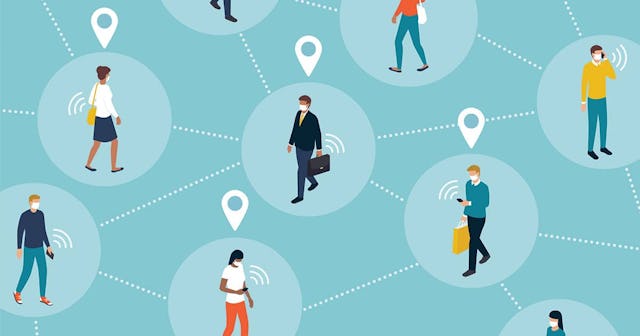Authorities Warn Of COVID-19 Contact Tracing Text Scams

If you get a text message from a contact tracer saying you’ve been exposed to COVID-19, don’t panic – it may be a scam
As the U.S. slowly reopens and we all adjust to new ways of life amid the coronavirus pandemic, authorities are warning of a new type of scam. If you get a text message from someone claiming to be a coronavirus contact tracer and saying you’ve been exposed to COVID-19, they might actually be trying to steal private information from you.
The Federal Trade Commission (FTC) has issued a warning about the new scam, which is pretty convincing. The text message people have reported receiving seems straightforward and legitimate: “Someone who came in contact with you tested positive or has shown symptoms for COVID-19 & recommends you self-isolate/get tested,” followed by a link you can click for more information.
It’s the link that’s the red flag that you’re being scammed. The FTC says clicking on it can download malicious software onto your smartphone, allowing hackers to access some of your private information.
So how do you protect yourself? It’s actually (thankfully) pretty simple: If you receive a text message from someone claiming to be a COVID-19 contact tracer, you shouldn’t have to do anything. If there’s a link, simply don’t click it.
“Unlike a legitimate text message from a health department, which only wants to let you know they’ll be calling, this message includes a link to click,” reads an FTC blog about the scam.
Contract tracers are legitimate, and they’re an important part of many cities’ and states’ post-COVID reopening plans, the FTC explains.
“They work with an infected person to get the names and phone numbers for everyone that infected person came in close contact with while the possibly infectious,” the FTC’s blog continues. “Those names and phone numbers are often kept in an online system.”
But if you’re receiving a text from a legitimate contact tracer, they’ll only be texting you to let you know you should expect a phone call from your local health department to follow up and discuss your next steps. They’ll never ask you in a text message to click a link or to provide any personal information, such as a social security number or bank information.
The FTC provided some ways to stop the unwanted scam messages before they even happen:
- Your phone may have an option to filter and block messages from unknown senders or spam.
- Your wireless provider may have a tool or service that lets you block texts messages.
- Some call-blocking apps also let you block unwanted text messages.
But the FTC says the best way for people to protect themselves is to ignore suspicious text messages. If it’s actually a COVID-19 contact tracer, they’ll call you to follow up.